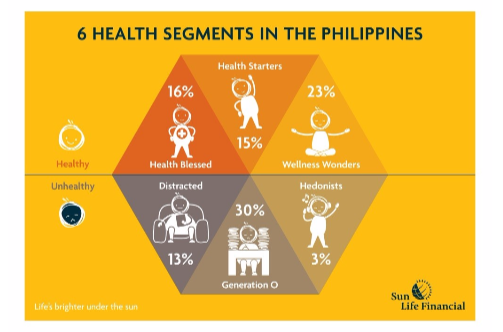New research from the Sun Life Asia Health Index 2015, now in its second year, shows a significant year-on-year increase of 18 percentage points in the proportion of people in the Philippines who say that being healthy is very important to them ─ up from 71 percent last year, to 89 percent. Despite being the most optimistic in the region about their overall health however, Filipinos are also the most worried over largely preventable conditions such as heart disease (60 percent versus 41 percent regionally) and diabetes (40 percent versus 31 percent regionally).
Canvassing the views of over 4,000 people aged between 25 and 60 years across nine markets in Asia, 2 the study shows that nearly all (97 percent) of the 700 respondents in the Philippines rank their personal health as an important aspect of their lives. Nevertheless, nearly half (46 percent) fall into ‘unhealthy segments, which include those who struggle with lack of time (Generation O, comprising the single largest segment in the Philippines at 30 percent) or are too easily distracted or unmotivated (newly identified ‘Distracted’ segment, 13 percent) to take action toward a healthier lifestyle. Both these segments are also least satisfied across all life aspects, including stress management, level of exercise and energy, quality of sleep, and level of happiness.
Other highlights include:
Filipinos top the region for sleeping less than six hours a day (46 percent versus 32 percent regionally) and eating unhealthily (41 percent versus 26 percent regionally);
Both the Philippines and Indonesia have the highest proportion of people (56 percent) who say they prefer to rest on the couch over exercising, behind only Hong Kong (58 percent);
Together with the Vietnamese, Filipinos are most likely to say they can be healthy without putting in effort (80 percent and 79 percent, respectively).
“What we are seeing is both a clear increase in the importance of health to people in the Philippines, an even greater state of readiness ─ in terms of attitude ─ for self-management in maximizing personal health, compared to last year’s baseline,” said Riza Mantaring, President and Chief Executive Officer of Sun Life Financial Philippines. “What hasn’t shifted, however, is the disconnect between the awareness that better lifestyle choices translate to improved personal health, and the action taken as a result of those choices.” 97 percent of people in the Philippines say they know how they can improve their health further, 93 percent say they do everything they can to maximize their health, and 96 percent say they support and encourage their family to live a healthy lifestyle. Yet being overweight or obese and respiratory conditions are among the top three health issues that they have personally experienced. Diabetes and heart disease, in turn, top the health issues experienced by family members, providing still further evidence of the gap between awareness and action.
Six distinct segments of attitudes toward personal health in the Philippines
Six segments were identified through the latest research. Three of these represent different sorts of unhealthy’ people, while the other three are people who are — in different ways – ‘healthy.’ Each segment is characterized by distinct perceptions, attitudes and behaviors that either hinder or enhancehealthy living. For example, ‘Health Starters’ ─ of which the Philippines has the highest proportion (15 percent) in the region ─ perceive themselves to be in good health, acknowledge that effort is needed to maintain it, and regularly engage in one health-directed action such as exercising, meditating or eating healthily.
“Sun Life is committed to developing programs that build stronger and healthier communities that are not only aware of health-related choices and consequences, but also engaged in actively developing greater self-efficacy3 in their own health care,” Ms. Mantaring continued. “Deeper insights into the Philippines’ Generation O ─ as well as each of the other five segments ─ will inform how we innovate product options with more customized incentives and benefits which would successfully motivate health-enhancing behaviors that are sustained over time, to avoid future healthcare cost.”
The research also shows that Filipinos rank highest in the region for having a family history of chronic health issues, suggesting significant scope and opportunity for pioneering solutions that help break bad habits and form new, healthier ones. Peer modeling (seeing other people similar to oneself succeed in reaching health goals and learning from their experience) and making small, incremental changes, could be beneficial. For example, ‘Wellness Wonders’ and ‘Health Starters’ can become more visible advocates of healthy living and provide support to the ‘unhealthy’ segments, while the ‘Distracted’ are encouraged to set realistic, measurable goals in just one type of health behavior (exercise or healthier eating) as a first step in their journey toward healthy living.
“We are equally committed to creating such immediate opportunities for everyone ─ employees, agents, clients, their families ─ to do just that alongside us at Sun Life,” said Ms Mantaring. “Community sporting events we sponsor include the annual SunPiology Run, in which several Sun Life colleagues participated ─ to exemplify our vision of self-care and health-directed behavior as a new norm.”



Leave a Reply